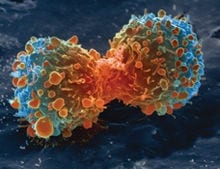 A Cuban lung cancer vaccine will have a trial in New York at the Roswell Park Cancer Center in Buffalo. The trial will begin in approximately 30 days with 60 to 90 lung cancer patients. The drug being tested, Cimavax, has already gone through testing in Cuba, Colombia, and Paraguay.
A Cuban lung cancer vaccine will have a trial in New York at the Roswell Park Cancer Center in Buffalo. The trial will begin in approximately 30 days with 60 to 90 lung cancer patients. The drug being tested, Cimavax, has already gone through testing in Cuba, Colombia, and Paraguay.
This drug is not new to many lung cancer patients in the US as the Internet is full of information on it and on locations within Cuba and Colombia, Peru, Bosnia-Herzegovina, and Paraguay where patients can get treatment. The initial treatment consists of four injections: two in the arms, and two in the buttocks. Many patients with Stage 4 non-small cell lung cancer used the 2014 lessening of travel restrictions to travel to Cuba for treatment with the vaccine and to acquire a supply to bring home. Currently this vaccine is not approved by the FDA and is unavailable in the US. The tightening of travel restrictions in 2017 has made traveling to get the vaccine more difficult. Even in the days of easier access to Cuba, the trip is not cheap. Between the administration of one dose of Cimavax, airfare, lodging, and vaccine vials to take back to the US, the cost is over $10,000.
What is Cimavax?
In the mid 1990s, Cuban researchers began work on a vaccine targeting lung cancer. The most recent trials in Cuba show that the vaccine is not a cure, but extends life three to five months. Researchers in Cuba are working on ways to increase these results and extend the use to other cancers. While patients see value in Cimavax, some American doctors are cautiously optimistic while others remain skeptical and believe much of the talk is hype and marketing with many more studies needed.
Cimavax, as well as the newer vaccine Vaxira, work by encouraging the patient’s immune system to fight the disease, but in different ways. Cimavax starves the cancer through antibodies binding to epidermal growth factor (EGF) – and cancer cells need EGF to grow. Vaxira, on the other hand, works by triggering an immune response against several cancers using a certain molecule that, hopefully, blocks the cancer’s growth.
Vaxira, since it is more recently developed, does not have the studies behind it to begin a trial at Roswell, though researchers are studying Vaxira with animals to learn if a clinical trial with humans is warranted.
Why Cuba?
While Americans often think of Cuba along with classic cars, cigars, and beautiful beaches, Cuba is much more. Their biotechnology industry is flourishing with top-level researchers. A number of factors led to this including the US embargo, the Soviet collapse, and Fidel Castro’s plan to make biotech one of the building blocks of Cuba’s economy. Cubans, being on their own, started making knockoff drugs that were so good they were the foundation of this industry. Cuba is the largest exporter of medicine within Latin America with over 50 countries as clients, and medications that are far less expensive than those from first-world countries.
Moving forward with lung cancer vaccine
The collaborations between the dedicated researchers at Havana’s Center of Molecular Immunology and those at Roswell Park Cancer Center began in 2011. They have often spent time in each other’s labs which has already led to ideas for other potential vaccine treatments. In the Roswell trial, Cimamax will be combined with a checkpoint inhibitor, Opdivo, to block proteins on cancer cells. Combining the expertise of such diverse scientists can exponentially increase the possibility of new and better treatments – and possibly cures – for lung cancer, and other cancers.
If the trial goes well at Roswell, it will attract more researchers to lend their knowledge and brain power; patients from around the world will have easier access to treatment; and hopefully American citizens will have access to this vaccine in the US.
